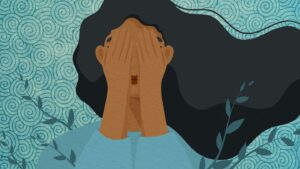Do you often feel sad or down, for no apparent reason? If so, you may be suffering from chronic dysthymia, a serious mood disorder. Dysthymia is characterized by long-term depression that lasts for at least two years. It can make it difficult to enjoy life and participate in activities that you once enjoyed. If you think you may have chronic dysthymia, it is important to seek treatment right away. In this blog post, we will discuss the symptoms and treatment options for chronic dysthymia.
Contents
What Is Chronic Dysthymia?
 Chronic dysthymia is a serious mood disorder that causes long-term, persistent feelings of sadness and low self-esteem. It is more common in women than men and usually begins in adolescence or young adulthood. Chronic dysthymia can last for years and can be very disabling.
Chronic dysthymia is a serious mood disorder that causes long-term, persistent feelings of sadness and low self-esteem. It is more common in women than men and usually begins in adolescence or young adulthood. Chronic dysthymia can last for years and can be very disabling.
It is a difficult disorder to treat because it is often not recognized as a serious problem. Many people with chronic dysthymia do not seek treatment because they believe that their feelings are normal or that they will never feel better.
According to studies, this condition is thought to affect around 0.75% of people in the general population, with a lifetime prevalence of up to three percent. However, the condition is often underdiagnosed and undertreated.
What Are the Symptoms of Chronic Dysthymia?
The symptoms of chronic dysthymia are similar to those of major depression, but they are less severe and last for a longer period of time (at least two years).
Symptoms include:
- Persistent feelings of sadness or emptiness
- Loss of interest in activities you once enjoyed
- Appetite changes (either increased or decreased)
- Difficulty sleeping (either insomnia or excessive sleeping)
- Fatigue or low energy
- Low self-esteem
- Trouble concentrating or making decisions
- Feelings of hopelessness/pessimism about the future
These symptoms can be debilitating and make it difficult to function in your everyday life. Also, it is important to note that chronic dysthymia can co-occur with other mental health disorders, such as anxiety or substance abuse.
If you think you may be suffering from chronic dysthymia, it is important to seek professional help. A mental health professional can diagnose the disorder and develop a treatment plan that is right for you. Chronic dysthymia is a serious mood disorder that requires treatment.
What Causes Chronic Dysthymia?
 The causes of chronic dysthymia are not fully understood, but it is thought to be caused by a combination of genetic and environmental factors. Let’s discuss some common causes of chronic dysthymia.
The causes of chronic dysthymia are not fully understood, but it is thought to be caused by a combination of genetic and environmental factors. Let’s discuss some common causes of chronic dysthymia.
Family history of mood disorders
This is one of the common causes of chronic dysthymia. If you have a family member who has suffered from depression, bipolar disorder, or another mood disorder, you are more likely to develop chronic dysthymia. Moreover, family history and genetic factors are thought to contribute to about 30% of the risk for developing chronic dysthymia.
Brain chemistry
Another common cause of chronic dysthymia is imbalances in certain chemicals in the brain. These chemicals, known as neurotransmitters, include serotonin and norepinephrine. Neurotransmitter imbalances have been linked to a number of other mood disorders, such as major depressive disorder and anxiety disorders. It is believed that chronic dysthymia may be caused by a combination of genetic and environmental factors.
Environmental factors
Certain environmental factors can also trigger the development of chronic dysthymia. These include:
It is important to note that chronic dysthymia is not simply a case of “the blues.” It is a serious mood disorder that can have a profound impact on every aspect of a person’s life. If you think you may be suffering from chronic dysthymia, it is important to seek professional help.
With proper treatment, it is possible to manage the condition and improve your quality of life. In fact, many people with chronic dysthymia go on to lead happy and fulfilling lives.
What Are The Complications?
 If you’re suffering from chronic dysthymia, you may also suffer from other mental health disorders, such as:
If you’re suffering from chronic dysthymia, you may also suffer from other mental health disorders, such as:
Reduced quality of life
A person with dysthymia may not find enjoyment in activities that used to bring them pleasure. This can lead to social withdrawal and isolation. Also, because dysthymia can last for years, it can take a toll on your personal relationships, career, and overall health. Quality of life is often significantly lower for people with dysthymia.
Poor work or school performance
Chronic dysthymia can interfere with a person’s ability to concentrate, make decisions, and remember information. This can lead to poor performance at work or school. For example, if you’re a student, you may have difficulty keeping up with your studies. And if you’re employed, you may have trouble meeting deadlines or completing projects.
Anxiety disorders
People with dysthymia are also at risk for developing an anxiety disorder, such as panic disorder, generalized anxiety disorder (GAD), social anxiety disorder, or agoraphobia. In fact, research has found that nearly half of all people with dysthymia also suffer from an anxiety disorder.
Substance abuse
Because people with dysthymia often self-medicate with alcohol or drugs, they’re at risk of developing substance abuse problems. In fact, research has found that up to 30 percent of people with dysthymia also suffer from alcoholism or drug addiction. Moreover, substance abuse can make dysthymia worse.
Other mood disorders
People with dysthymia are also at risk for developing other mood disorders, such as major depressive disorder or bipolar disorder. In fact, research has found that people with dysthymia are eight times more likely to develop major depression than the general population. In fact, dysthymia is often mistaken for major depression. Even personality disorders, such as borderline personality disorder, are more common among people with dysthymia.
Self-harm and suicidal thoughts
 Because dysthymia can be so debilitating, it’s not surprising that people with the disorder are at increased risk for suicide. In fact, research has found that up to 15 percent of people with dysthymia attempt suicide. If you’re suffering from dysthymia, it’s important to get help. Self-harm is often a sign that a person is in distress and needs help. If you’re thinking about harming yourself, please seek professional help immediately.
Because dysthymia can be so debilitating, it’s not surprising that people with the disorder are at increased risk for suicide. In fact, research has found that up to 15 percent of people with dysthymia attempt suicide. If you’re suffering from dysthymia, it’s important to get help. Self-harm is often a sign that a person is in distress and needs help. If you’re thinking about harming yourself, please seek professional help immediately.
So, these are some complications and negative effects of chronic dysthymia. If you or someone you know is suffering from this disorder, please get help. There are many effective treatments available. With treatment, people with dysthymia can lead happy and fulfilling lives.
How It Is Diagnosed?
The diagnosis is actually made by a professional who is trained in mental health, such as a psychiatrist, psychologist, or clinical social worker. To be diagnosed with chronic dysthymia, a person must have had a low mood for most of the day, more days than not, for at least two years.
In fact, the diagnosis is generally done with a clinical interview and the use of a standardized questionnaire. The most commonly used questionnaire to diagnose dysthymia is the Hamilton Rating Scale for Depression, which consists of 17 items that focus on symptoms experienced over the past week.
A person must have at least five of the nine core symptoms to be diagnosed with chronic dysthymia. Additionally, a mental health professional can do a physical exam to rule out any other potential causes of the person’s symptoms.
It is important to note that a diagnosis of chronic dysthymia can only be made if the person does not also meet the criteria for major depressive disorder. If a person has both disorders, they are said to have “double depression.” It is important to get an accurate diagnosis so that the correct treatment can be provided.
What Are the Treatment Options?
 There are a number of ways to treat chronic dysthymia, and the best approach depends on each individual case. Let’s discuss the treatment options available.
There are a number of ways to treat chronic dysthymia, and the best approach depends on each individual case. Let’s discuss the treatment options available.
Medication
It is important to note that there is no one specific medication for dysthymia. Instead, antidepressants are often used to treat the disorder. Antidepressants can be effective in reducing the symptoms of dysthymia, but they may not be suitable for everyone.
Also, there are several different types of antidepressants, and it may take some trial and error to find the one that works best for you. Some of the commonly prescribed antidepressants include:
- SSRIs (selective serotonin reuptake inhibitors)
- SNRIs (serotonin and norepinephrine reuptake inhibitors)
- MAOIs (monoamine oxidase inhibitors)
- TCAs (tricyclic antidepressants)
In addition to antidepressants, other medications may be prescribed to help with specific symptoms. For example, if you are struggling with insomnia, your doctor may prescribe a sleep medication. Overall, it is essential to talk to your doctor about the best medication option for you.
Psychotherapy
Psychotherapy, or counseling, is another common treatment option for chronic dysthymia. This form of treatment can help people with chronic dysthymia identify and change negative thoughts and behaviors. Psychotherapy can also help people develop coping skills for dealing with difficult situations. There are many different types of psychotherapy, some of these include:
- Cognitive-behavioral therapy,
- Interpersonal therapy
- Problem-solving therapy
Therapies are typically provided by psychologists, counselors, social workers, or psychiatrists. If you are interested in pursuing psychotherapy, talk to your doctor about referrals. You can also try searching for mental health providers in your area.
ECT is a newer form of treatment that has shown promise in treating chronic dysthymia. This form of treatment involves sending electrical impulses to the brain. It is defined as electroconvulsive therapy. Studies have shown that ECT can be an effective treatment for chronic dysthymia, especially when other treatments have failed.
Support groups
Support groups are a great way to meet other people with chronic dysthymia and to learn about coping mechanisms. There are many online groups as well as in-person groups. More often, support groups are led by a mental health professional and some groups even offer medication management.
It is really important for you to find a group that you feel comfortable with. If you do not feel comfortable with the first group you try, it is okay to find another one. There are many groups out there and you will eventually find one that is a good fit for you.
Herbal remedies
 This option is usually chosen by people who prefer natural treatments. St. John’s wort is the most popular herb for mild to moderate depression. This plant has shown some promise in treating dysthymia, but more studies are needed to confirm its effectiveness. Other herbs that have been studied for dysthymia include:
This option is usually chosen by people who prefer natural treatments. St. John’s wort is the most popular herb for mild to moderate depression. This plant has shown some promise in treating dysthymia, but more studies are needed to confirm its effectiveness. Other herbs that have been studied for dysthymia include:
- Ginkgo biloba
- Omega-three fatty acids
- S-adenosylmethionine (SAMe)
Dysthymia is a serious mood disorder that can have a profound effect on your quality of life. With herbal remedies, there are often fewer side effects than with traditional medications. If you’re considering using herbal remedies, be sure to talk to your doctor first.
Self-care tips
Self-care is something that is advised even for people who don’t have a mood disorder. But for those of us who do suffer from chronic dysthymia, self-care is essential. It can be difficult to take care of ourselves when we’re feeling down, but it’s important to try.
Here are some self-care tips that may help you if you’re suffering from chronic dysthymia:
- Make sure to get enough sleep. This can be difficult when you’re feeling down, but it’s important to try.
- Eat a healthy diet. Again, this can be difficult when you’re not feeling well, but it’s important to fuel your body with healthy food.
- Exercise. This can be hard to do when you’re not feeling your best, but it can help to improve your mood.
- Spend time with people who make you feel good. This may mean spending less time with people who bring you down.
- Do things that make you happy. This could be anything from reading to listening to music to spending time in nature.
If you suffer from chronic dysthymia, know that you’re not alone. There is help available, and you can get better. These self-care tips may be a good place to start.
Conclusion
To conclude, chronic dysthymia is a condition that should not be taken lightly. It can have a profound effect on an individual’s quality of life and their ability to function day-to-day. If you think you may be suffering from chronic dysthymia, it is important to seek professional help. With proper diagnosis and treatment, many people are able to lead happy and fulfilling lives.
For more information, please contact MantraCare. Depression is a mental illness characterized by persistent feelings of sadness, hopelessness, and loss of interest in daily activities. If you have any queries regarding Online Depression Counseling experienced therapists at MantraCare can help: Book a trial Depression Therapy session


